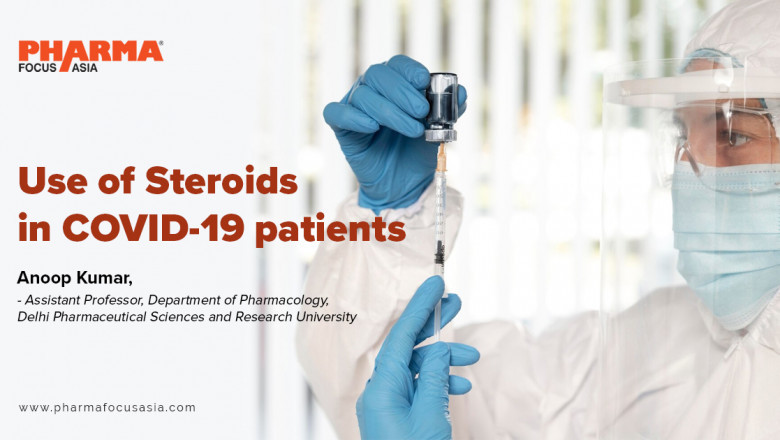views
Use of Steroids in COVID-19 Patients
COVID-19 infection has been affecting every one of us for the last year and continues to affect us so far through various new strains. Recently, a new variant, i.e., Omicron, of COVID-19 emerged and started spreading across the globe. The major objective today is to save the patients as we can from the lethal effect of this virus. Reports have shown the massive increase in various inflammatory mediators of COVID-19 patients, resulting in cytokine storm and death. Steroids are well-known, powerful anti-inflammatory agents available on the market for the management of various diseases. Thus, use of steroids in COVID-19 patients could have the potential to reduce mortality. However, there is a lot of confusion regarding the use of steroids in COVID-19 patients, as unnecessary use of these agents could result in various adverse drug reactions (ADRs). This article briefly presents the role of the immune system and the importance of steroids in COVID-19 patients. Further, the main findings of recent meta-analysis done by our team are also summarized.
COVID-19 is already declared a pandemic by the World Health Organization, and various new strains are also emerging across the globe and creating havoc. Vaccines are being developed and showing promising results in the prevention of this infection. The role of vaccines against new strains is completely unclear so far. Further, till now, no specific drug is available for its treatment. Various classes of drugs such as specific antibiotics like doxycycline, azithromycin, etc.; anthelmintics like ivermectin; anti-gout agents like cholchicine; anti-viral agents like remdesivir, favipiravir, etc.; monoclonal antibodies like trastuzumab; antimalarials like hydroxychloroquine; anti-inflammatory agents like indomethacin; analgesics and antipyretics like paracetamol are being used in the management of COVID-19 patients depending upon the condition of the individual. Researchers across the globe are working hard to come up with a specific molecule against this infection.
The SARS-Cov-2 enters into body and spike protein specifically attached to the angiotensin converting ezyme (ACE-2) of the host followed by entry of the virus inside the cell. The SARS-Cov-2 is a single stranded RNA virus which uses the machinery of the host cell and make millions of copies. As we know that immune system play a significant role in protection of body against exogenous agents. Immune system is broadly divided into two parts i.e. innate immune system and adaptive immune system. The skin, mucous membranes, white blood cells (WBCs) are part of innate immune system whereas T and B cells are parts of the adaptive immune system.
Normally, skin protects us against harmful agents through keratin protein, but if exogenous agents enter through the mouth, nose, etc., the mucous membrane contains specific enzymes that do degradation of these agents. Further, if exogenous agents enter into blood circulation, WBCs will do the degradation and removal through the process of phagocytosis. The most important feature of the immune system is to distinguish between self and non-self. The specific type of receptors called pattern recognition receptors (PRRs) act as a sensor for pathogen-associated molecular patterns (PAMPs) of exogenous agents.
Explore more: https://www.pharmafocusasia.com/articles/use-of-steroids-in-covid-19-patients















![What Is The QuickBooks Enterprise Support Number [[GET Quick Assistance]]](https://timessquarereporter.com/public/upload/media/posts/2025-06/04/what-is-the-quickbooks-enterprise-support-number-get-quick-assistance_1749095947-s.jpg)






Comments
0 comment